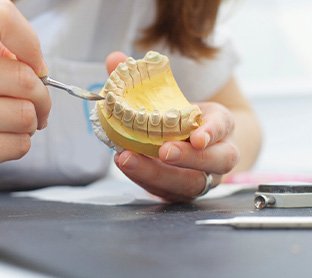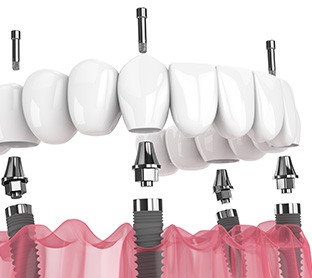Dentures – Raleigh, NC
A Traditional Fix for Tooth Loss
Yes, tooth loss is a hard thing to bear. It can make many everyday tasks – eating, speaking, smiling, etc. – more difficult than usual. Even so, you don’t need to live with such a burden. Our practice can restore your smile with dentures in Raleigh. Using these prosthetics, Barker, Rohner and Hunt DMD will give your gorgeous grin back to you. Find out more by reading below or by booking a visit to our office.

Who's a Good Candidate for Dentures?

Almost anyone with one or more missing teeth can be a suitable candidate for dentures. The first step to receiving one of these amazingly functional and comfortable prosthetic dental appliances is to schedule a consultation at our Raleigh office so one of our skilled dentists can evaluate your mouth and determine the best way to replace your teeth. If you’re not ready for dentures yet, you may be able to become an excellent candidate later after receiving restorative treatments to address oral health issues like gum disease.
Effects of Missing Teeth

Tooth loss is an incredibly common problem across the world, and common reasons for it include tooth decay, gum disease, injury, age, and excessive wear and tear. Tooth loss can lead to a range of negative health consequences including:
- Facial sagging due to the teeth no longer supporting the cheeks
- Speech difficulties caused by changes to the way air moves about the mouth
- Difficulty eating that can lead to problems like indigestion and malnutrition
- Diminished self-esteem due to not being confident in your smile
What Qualifies You for Dentures?

Dentures can be an excellent treatment for those who live with extensive tooth loss, uncomfortably sensitive teeth, or severe dental decay as long as they have sufficiently healthy gums and jawbones. People who receive dentures will also need to commit to excellent oral hygiene practices as well as a thorough maintenance regimen for their appliance.
The best type of denture for you depends on how many teeth you are missing. A partial denture can replace one or more teeth throughout the mouth while a full denture can replace an entire arch. If you’re looking for an appliance that gives you maximum chewing power, implant dentures may be an excellent choice for you. Since dentures are often less costly than other tooth-replacement devices, they can be an especially great option for patients on budgets.
Alternative Tooth-Replacement Options

If dentures are not the best form of tooth replacement for you, we offer several other tooth replacement options. These include:
- Dental bridges: These devices are great for patients who are missing one or more teeth in a row, and they are held in place with crowns placed on healthy teeth on either side of the gap or dental implants placed in the jawbone.
- Dental implants: These titanium posts are designed to mount lifelike dental restorations after being surgically placed in the patient’s jawbone. Candidates will need sufficient bone density for these appliances, and, while they are more costly than traditional dentures, they are permanent.
Types of Dentures

After reviewing your consultation results, we’ll outline the types of dentures on offer. We’ll likely suggest you get one of the following three options:
Partial Dentures
A partial denture (per its name) only replaces a few teeth. Given this trait, it often fits onto your gumline by clasping onto nearby teeth. The device then blends with your gum tissue by using a pink acrylic base. This latter part is customized for a snug fit, though poorly-made dentures can feel loose.
Full Dentures
Unlike a partial one, a full denture replaces an entire arch of teeth. That means it only relies on suction to stay in place (not metal clasps). In other words, the dentist won’t alter any remaining teeth for this item. The denture’s materials aren’t too unique otherwise. Like other kinds, it has a base made of pink acrylic and resin.
Implant Dentures
In contrast to regular full dentures, implant types attach to dental implants. These latter restorations are set in your jawbone and slowly fuse with its bone tissue. By doing so, they keep the implant denture very secure and stable. It won’t slip around in your mouth or allow your face to collapse.
Given such facts, implant dentures suit patients who want non-traditional options. They remain unmoving in ways that regular dentures can’t.
How are Dentures Made?

The process of creating dentures takes place over several weeks and multiple visits to the office, because precision is extremely important for a long-lasting, functional prosthetic. Our dentists at Barker, Rohner & Hunt DMD will personalize your treatment to meet your individual needs and walk you through what you can expect. We’ve also included some helpful details about the custom creation process of your dentures below so you can better understand just how your replacement teeth come to be!
What are Dentures Made Of?

Dentures come in different styles to help address varying types of tooth loss, which means that no two prosthetics are made the same. If you’re receiving a partial denture to restore several missing teeth throughout your arch, you can expect the base to be made from metal or gum-colored acrylic. It will be custom-designed to fit like a puzzle piece between your existing teeth, securely slotting in place. On the other hand, the base of full dentures is typically only crafted from custom-formed, gum-colored acrylic, because it’s more visible.
After the base of your dentures is crafted, the dental laboratory technicians will go on to create, shape, shade, and texturize your replacement teeth. Typically, these are made from durable materials that can mimic the appearance of natural teeth, like porcelain or ceramic. Not only does this make your replacement virtually indistinguishable from your natural teeth, but these materials are also able to resist staining and endure daily use.
The Denture Creation Process

Every denture that we help make at Barker, Rohner & Hunt DMD is customized for our individual patient. We’ll start by taking an impression of your mouth that we’ll send off to our laboratory. We may also create a plaster mold of your mouth in-house to send to the laboratory. Once it arrives, they’ll begin creating a wax model of your mouth and individually designing each of your replacement teeth to set into it. Before moving onto the next part of the process, the laboratory may send the prototype back to our office so we can have you try it on and check the bite.
Acrylic is injected into the wax mold to help create the gumline of the prosthetic that will utilize natural suction or support the metal base to stay in place within your mouth. After the gum-colored acrylic has set, the wax will be melted away and the dentures will be placed in an ultrasonic bath to remove any lingering wax or plaster. Finally, the lab technician will polish the denture and make any finishing touches before sending it back to our office for you to try on for the last time!
Adjusting to Your New Dentures

After you get your dentures, they will likely feel foreign and unnatural in your mouth, but rest assured this is completely normal. It usually takes patients about 30 days to fully adjust to eating, speaking, and wearing their dentures. To help strengthen your facial muscles and support your new replacement teeth, try reading aloud or reciting the alphabet to yourself in the shower. It’s also a good idea to take very small, easy-to-chew bites of food while you’re still getting used to eating with them. If it has been longer than a month and you don’t feel like you’re adjusting to your dentures, give our team a call!
Benefits of Dentures

For people who wear dentures, they do more than just fill in gaps. These prosthetics can actually provide a path to a higher quality of life. Whether you're missing several teeth or need a full replacement, dentures restore essential functions like eating and speaking while also enhancing your confidence and facial appearance. At Barker, Rohner and Hunt DMD of Raleigh, we design custom denture appliances that are comfortable, functional, and natural-looking. With the right set, you'll enjoy improved health, social comfort, and a smile you’ll be proud to show off.
Psychological Benefits

Tooth loss can take a serious emotional toll, more than many people realize. Some feel like they can’t smile at all, and this can lead to embarrassment, social withdrawal, or even depression.
Dentures offer a powerful boost in self-esteem by restoring your smile and helping you feel more like yourself again. At our Raleigh dental office, we’ve seen how a new smile can rekindle confidence, restore self-image, and allow patients to reconnect with the people they love. Simply put, dentures don’t just change how you look, they change how you feel!
Clearer Enunciation

You may have never thought about it, but your teeth are actually a vital component in how you form words. When they go missing, it can cause speech to become unclear or slurred. Denture prosthetics fill in these gaps, allowing your tongue and lips to move properly during conversation once again.
There can be a small adjustment period when you first put your dentures in, but once you’ve adjusted, you’ll likely notice clearer, more confident speech. Our dental team in Raleigh loves helping patients regain their voices so they can speak with clarity to everyone they meet.
Improves Nutrition

Proper chewing is essential for a healthy diet and digestion. Without teeth, it’s hard to eat a large variety of nutrient-rich foods, which can often lead to meal avoidance and nutritional imbalances that threaten overall health.
Dentures restore your ability to chew thoroughly, which improves digestion and supports gut health. Once your new dentures are in place, they should fit and function naturally, so you can enjoy your favorite foods and get what your body needs.
Preserves Oral Health

Even if you’re missing teeth, your oral health still matters. Dentures help support your smile by preventing remaining teeth from shifting. This keeps your bite aligned properly and supports the shape of your face by keeping your lips and cheeks from drooping.
When fitted properly, dentures reduce strain on your gums and joints, minimizing discomfort and long-term complications. With routine maintenance, they also help keep your mouth clean and balanced for easier oral care and fewer dental problems.
Expands Opportunity

A confident smile can open both social and professional doors. In fact, a study from Kelton Research found that people with straight, healthy-looking smiles are 58% more likely to be perceived as successful and 45% more likely to get a job.
Well-fitted prosthetics can restore your confident smile, making it easier to connect, interview, and shine in both social and professional settings. At Barker, Rohner and Hunt DMD of Raleigh, we believe a new smile isn’t just something you wear, it’s a key to new possibilities.
Understanding the Cost of Dentures

The cost of dentures doesn’t have to be an unnerving reality. Instead, the only way it can be determined is with a scheduled visit with a member of our team. Our evaluation of your mouth and careful treatment planning to determine your needs will allow us to craft a clear estimate you can review. We’ll go over the details and discuss ways to lower your out-of-pocket costs from the beginning.
Factors That Affect the Cost of Dentures

Before we establish how much you can expect to pay for your dentures, we will need to look at the different factors that ultimately formulate your proposed cost expectations. These include:
- The number of teeth you are missing
- The type of prosthetic you need – full, partial, or implant denture
- Whether you need preliminary treatment, such as bone grafting, gum disease treatment, tooth extraction, etc.
- The kind of materials that will be used to create your new set of teeth
Are Implant Dentures More Expensive?

Yes, you can expect implant dentures to be much more expensive than traditional prosthetics. There are a few reasons, such as the surgical placement of these artificial teeth and the materials used to create implant dentures, which are largely titanium.
While the upfront cost may be higher initially, the long-term investment you’ll be making in your smile is worth it. You’ll appreciate being able to finally eat all your favorite foods, speak without slurring any of your words, and smile with the utmost confidence.
Does Dental Insurance Cover Dentures?

There is good news when preparing to pay for your dentures. Most dental insurance companies will agree to pay a portion of the total cost. This is because dentures are viewed as a medical necessity. They help improve your oral health, which is essential if it’s to be covered by dental insurance.
How much your insurance will pay depends on what is still available as part of your plan.
Other Options for Making Dentures Affordable

Since not all dental insurance plans work the same way, it’s important to have a backup plan in case you’re not covered for dentures. Fortunately, our dental office is pleased to provide an in-house membership plan.
By paying one low annual fee, you can receive preventive care and a valuable discount to use on all other available treatment options. This means you can save, should you decide that dentures may be the best option for replacing your missing teeth.


